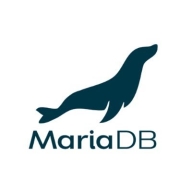

MariaDB and PlanetScale are competing in the database solutions category. Data comparisons indicate that PlanetScale has the upper hand due to its advanced features which many find justify its cost.
Features: MariaDB offers comprehensive open-source capabilities, scalability, and advanced analytics. PlanetScale features a powerful serverless architecture, simplified workflows, and seamless scaling without requiring database maintenance.
Room for Improvement: MariaDB could enhance its serverless and modern architecture features, which currently lag behind PlanetScale. Additionally, more intuitive workflows and maintenance-free scaling could benefit MariaDB. PlanetScale could improve affordability, increase open-source capabilities, and strengthen its analytics features to compete better in areas where MariaDB excels.
Ease of Deployment and Customer Service: MariaDB provides straightforward on-premise and cloud deployments with robust support services. PlanetScale offers a fully-managed, serverless deployment model that emphasizes ease and automation, reducing operational overhead.
Pricing and ROI: MariaDB is known for its low upfront costs, making it appealing for budget-conscious users and often resulting in a high perceived ROI. PlanetScale may have higher initial costs but promises significant returns through innovative features and reduced administrative complexities.
| Product | Market Share (%) |
|---|---|
| MariaDB | 5.9% |
| PlanetScale | 0.3% |
| Other | 93.8% |


| Company Size | Count |
|---|---|
| Small Business | 26 |
| Midsize Enterprise | 12 |
| Large Enterprise | 25 |
| Company Size | Count |
|---|---|
| Small Business | 7 |
| Large Enterprise | 2 |
MariaDB is an open source relational database created by the original founders of MySQL. It is considered one of the most popular and trusted database servers throughout the world. MariaDB is a valued component found in most cloud offerings and is the default in many Linux tools. It is also widely used by Wikipedia, WordPress, and Google, among other well-known sites. Maria DB easily melds data into concise information from a vast array of applications, such as banking, online shopping, websites, and more.
MariaDB was originally created to improve MySQL performance. It is the most widely chosen database server due to the solution being super fast, robust, user-friendly, and easily scalable. MariaDB also offers a substantial ecosystem of plugins, storage engines, and numerous other valuable tools that make it very attractive for a significant offering of use cases.
The solution’s newest functionalities include compatibility with Oracle Database and Temporal Data Tables, and advanced clustering with Galera Cluster 4, which make it easier for users to research data history from any point in the past. Additionally, the most recent versions include JSON and GIS features. MariaDB is committed to staying an open source solution.
MariaDB Features
Reviews from Real Users
Faustine C., Engineering Supervisor- Corporate Data Solutions and Services at TZ Telecoms Corporation, shares, “The software provides a lot of information on what is happening inside the database. For most performance parameters it is easy to know if something is not right in the configuration or optimization which helps engineers take remedial fine-tuning measures. For example, if the database is underperforming it is easy to know which performance parameter can be adjusted to handle the workload. It is difficult to troubleshoot database issues if many performance parameters can not be monitored or debugged which is the case with some database management systems. It provides great monitoring of data storage, processing, and performance stability which is really important for real-time data storage and processing. It's a user-friendly product.”
A PeerSpot user who is a Senior Engineer at a tech services company relates, “ The solution's high availability is its most valuable aspect. We have found the product to be stable and the initial setup is pretty simple. I'd rate the solution at a ten out of ten. I'm very happy with it overall. I would recommend the solution to others. It's easy to find details about the product online and to learn about it.”
PlanetScale offers seamless database management with features tailored for modern development environments, enabling enhanced project operations through efficient integration and ease of use.
PlanetScale is designed to support modern developer workflows through features like automated connection pooling and constant availability, making it ideal for serverless applications. Its integration with tools like GitHub and Prisma enhances the developer experience, allowing fast setup and effortless database interactions. However, users note challenges with analytical queries due to row-based billing and the absence of foreign key constraints. Integration with platforms such as Firebase and Next.js presents additional hurdles. Recent changes, such as the removal of the free tier, have impacted adoption by hobby developers, highlighting a need for more accessible pricing plans.
What are the most important features of PlanetScale?PlanetScale finds significant use in hosting databases for portfolios, company websites, and academic projects. Its compatibility with Prisma facilitates seamless MySQL database management online. Users leverage its capabilities for analytical queries and manage data environments effectively. Teams value the platform for specialized tasks such as URL shortening and social media automation, which are crucial in rapidly evolving digital industries.
We monitor all Relational Databases Tools reviews to prevent fraudulent reviews and keep review quality high. We do not post reviews by company employees or direct competitors. We validate each review for authenticity via cross-reference with LinkedIn, and personal follow-up with the reviewer when necessary.